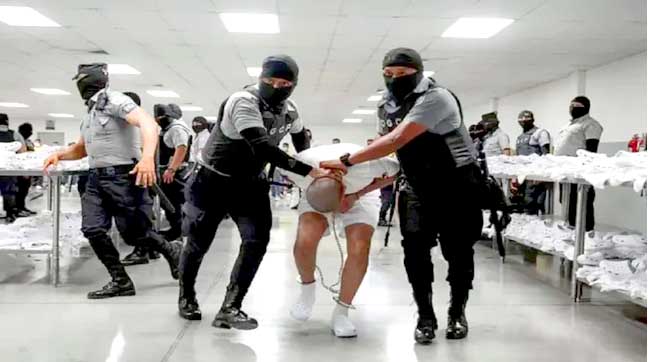VENEZUELA has condemned El Salvador for ‘grave crimes against migrants’, citing human trafficking, xenophobia and illegal deportations.
It demands the immediate release of 252 Venezuelans.
Venezuela’s Foreign Ministry issued a forceful response to a diplomatic note from El Salvador, accusing the government of Nayib Bukele of committing ‘grave violations of international human rights law’ and acts that could constitute ‘international criminal offences’ against 252 Venezuelan citizens deported from the United States and held in Salvadoran prisons.
Foreign Minister Yván Gil labelled the situation ‘grave crimes against migrants’, asserting that El Salvador’s communication amounts to an ‘express confession’ of these acts.
In an official statement, Venezuela Foreign Ministry detailed that the detainees have been deprived of liberty ‘without judicial order or prior trial’ in a maximum-security facility, subjected to ‘degrading and inhumane conditions’, with no contact with families or lawyers, which would make them ‘victims of the severe crime of human trafficking’.
It also denounced ‘institutional xenophobia’ for collectively linking migrants to criminal organisations ‘without individual evidence’, violating the principle of presumption of innocence.
The text further rejected the ‘denial of the right to defence, due process, and access to justice’, arguing that the lack of information about charges and the inability to appear before courts equates these cases to ‘forced disappearance’.
Additionally, it branded as a ‘legal aberration’ and ‘morally inadmissible’ a proposal by El Salvador to condition the release of Venezuelans on an exchange for Salvadorans detained in Venezuela for ‘serious criminal acts’, stressing that this approach lacks legal basis.
Venezuela also blamed the United States for the ‘kidnapping and forced transfer’ of migrants to Salvadoran territory without legal processes, a practice that, according to Caracas, violates international law and has been condemned, even by US courts.
The Venezuelan government demanded the ‘immediate and unconditional release’ of the detainees and called for urgent answers to a questionnaire from Venezuela’s Public Ministry.
This includes requirements such as identifying the detained individuals, the crimes alleged, the status of their legal proceedings, and ‘internationally verifiable proof of life’ for their families.
Venezuela warned that it holds El Salvador responsible for any harm to the detainees’ ‘physical and psychological integrity’ and urged an immediate resolution amid escalating bilateral tensions fuelled by ideological differences.
Meanwhile, Venezuelan President Nicolás Maduro is promoting a unified strategy to ensure electoral transparency, denouncing opposition attempts to sabotage the elections and reverse the social achievements of the people.
During a meeting with left wing GPPSB (Simón Bolívar Great Patriotic Pole – Gran Polo Patriótico Simón Bolívar) candidates, the president reaffirmed his commitment to consolidating the revolutionary majority in the National Assembly and protecting the social advances achieved.
The president characterised the upcoming elections as a ‘popular resistance act’ against what he termed ‘corrupt practices by sectors seeking to surrender the homeland’.
He urged citizens to neutralise any attempts to delegitimise or destabilise Bolivarian democracy.
Maduro presented the Second National Popular Consultation as a ‘direct democracy exercise’ where communities prioritise local development projects.
‘Here, the elites do not decide, the organised people decide,’ he stated.
Recalling 29 victories in 31 electoral processes since 1999, Maduro emphasised that the Bolivarian Revolution maintains its historical legitimacy.
‘No nation demonstrates our level of sustained popular support,’ he asserted.
The proposed programme prioritises laws to strengthen the productive economy and protect labour rights.
‘The new National Assembly will be a trench against economic warfare,’ Maduro declared.
The Venezuelan leader stressed that civil-military unity will be key to protecting the elections from external interference.
‘Our people are a shield against neocolonialism,’ he stated, alluding to international criticism of the electoral process.
The Second National Popular Consultation will serve as a social oversight mechanism for public policies, enabling communal councils to define investments in health and education.
‘This is democracy from below,’ Maduro emphasised.
The Simón Bolívar Campaign Command will integrate citizen monitoring networks and electoral technology.
‘Every voter will be a guardian of their rights,’ the president said, detailing protocols to prevent irregularities.
President Maduro concluded by urging citizens to ‘transform every community into a revolutionary stronghold’.
‘With conscious discipline, we will defend peace and comprehensive development,’ the President affirmed.
- The International Monetary Fund (IMF) has sounded alarms by forecasting a 0.3% contraction in Mexico’s GDP for 2025, attributing it to tariffs imposed by the United States and geopolitical uncertainty.
However, President Claudia Sheinbaum dismissed the projections, asserting that her administration prioritises autonomous economic models and the ‘Plan Mexico’ to strengthen manufacturing and domestic markets.
The IMF slashed its 2025 growth forecast by 1.7 percentage points, stating that Mexico will be the hardest hit by US protectionist measures, even more than Canada or China.
Despite the United States-Mexico-Canada Agreement trade framework, the IMF argues that tariffs on Mexican products, including those recently announced by Trump, will stifle growth.
During her morning press conference, the Mexican leader rejected the IMF’s outlook, accusing the institution of underestimating state capacity to counter external crises.
She said: ‘They’re used to dictating policies, but we disagree with their neoliberal vision.’
Sheinbaum emphasised that Mexico’s Finance Ministry uses independent models predicting stability.
As an alternative to austerity measures, the government will unveil a package on May 5th to boost manufacturing and reduce US dependency under the ‘Plan Mexico’.
While details remain undisclosed, Sheinbaum stressed it will prioritise public investment, local employment, and productive sovereignty, aligning with her anti-neoliberal agenda.
The Organisation for Economic Co-operation and Development (OECD) projected a 1.3% GDP contraction for 2025, doubling the IMF’s pessimism.
Both institutions agree that trade tensions will restrict financing access and increase inflation, particularly in automotive and agro-industrial sectors.
Analysts aligned with Mexico’s Fourth Transformation (4T) movement argue the IMF ignores the impact of social programmes like universal pensions and record-high minimum wages, which sustain domestic consumption.
They also criticise the institution for overlooking reindustrialisation efforts in southern Mexico, driven by projects like the Interoceanic Corridor.
